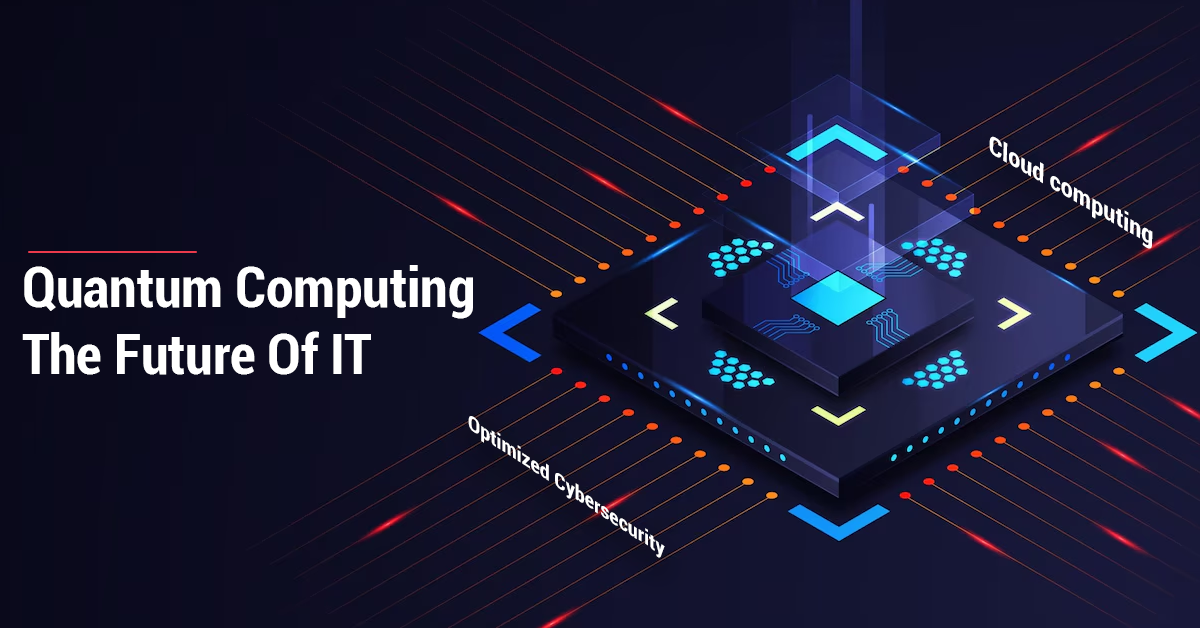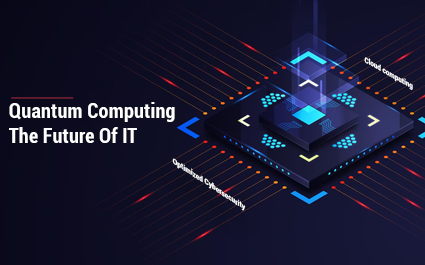
Quantum computing is a technology that has brought revolution in the IT landscape. It has changed the future of information technology and computing. While conventional computers process data in bits—representing 0s or 1s—quantum computers use quantum bits or qubits, which can exist in multiple states simultaneously. This means that quantum computers can efficiently perform complex calculations faster than any traditional computers. Creating new possibilities in technology and IT support industries.
This technological evolution has profoundly changed how companies process data and solve complex problems. This article will explore the promising future of quantum computing technology, what it means for IT support industries, and the exciting possibilities we can expect from quantum computing.
The Rise Of Quantum Computing In Information Technology
In its early days, quantum computing was primarily speculative and limited to labs and R&D. However, recent advances by companies like IBM, Google, and Microsoft have brought quantum computers closer to real-world applications. The IT industry, known for its adaptability, is already prepared to harness the increased computing power offered by these systems.
Quantum computing's ability to solve what classical computing currently cannot do has far-reaching implications for IT. Here are some areas where quantum computing is changing the IT landscape:
-
Improved data processing and storage
Traditional computers take much more time than quantum computers to process large amounts of data. In today’s data-centric world ruled by artificial intelligence, companies face huge challenges in collecting large numbers of data more data and processing them due to a lack of processing speed and energy. Here comes quantum computers at the rescue. They are capable of searching and processing data at lightning speed.
When quantum computing is synced with data analytics, machine learning, and artificial intelligence, data processing becomes quick and effective. Quantum computing can quickly identify patterns and relationships in data, resulting in faster decision-making strategies and better prognosis.
-
Optimized Cybersecurity
The evolution of quantum computing has primarily impacted cybersecurity.
Traditional computers need help with modern encryption techniques, such as elliptic curve cryptography and RSA, as they are based on the complexity of encoding. However, these problems can be easily solved using quantum computing, giving more space for quantum attacks.
This technology is a double-edged sword for the IT industry, presenting threats and benefits simultaneously. Quantum-resistant encryption algorithms have been developed to ensure that data remains secure in the post-quantum world. The IT support industry must be ready to integrate these advanced encryption techniques to protect companies against quantum cyber attacks.
-
Cloud computing
Cloud computing has become the nucleus of information technology today, supporting organizations in extending their services and storing large volumes of data. Quantum computing may revolutionize the future by creating new avenues for gigantic efficiency, security, and scalability improvements in cloud services.
Organizations like IBM are currently developing quantum cloud computing through its IBM Quantum Experience, which permits the remote use of quantum computing resources. For this purpose, support services from the Information Technology sector must evolve to aid enterprises in adopting quantum cloud systems and facilitate the smooth integration of quantum functionalities into their pre-existing operational processes.
How Quantum Computing is Revolutionizing IT Support Services?
Infusing quantum computing into IT support services is expected to revolutionize their operational dynamics. The amount of data that quantum computing can handle and process with more speed and accuracy directly implies that IT support will be more efficient, responsive, and effective at handling complex technical challenges.
-
Faster Problem Resolution
Traditionally, IT support relies on time-consuming troubleshooting and diagnostic processes. However, quantum computers' efficient processing capacity can identify and solve problems in real-time. For instance, quantum algorithms can quickly sense system complexity, such as networking errors or database inconsistencies, which reduces downtime and increases overall efficiency.
IT support teams can apply quantum computing to perform system diagnostics and repairs more rapidly. This revolution means that a business will suffer fewer delays in IT repair, leading to uninterrupted and less expensive operations.
2. AI- Empowered Support Tools Evolve
As quantum computing propels artificial intelligence and machine learning advancements, IT support services will progressively depend on AI-driven tools to deliver more refined support solutions. The AI-powered tools will employ quantum-enhanced algorithms to predict the onset of potential problems before their emergence, automate standard maintenance procedures, and furnish real-time suggestions to optimize IT environments.
With quantum, IT support services will become predictive rather than reactive. AI, empowered by quantum computing, analyzes historical data, system usage patterns, and possible threats to suggest preventions and help businesses avoid costly IT problems.
3. Enhanced Cybersecurity Solutions
As quantum computers may eventually break classical encryption methods, IT support services should pay extra attention to upgrading their security protocols. Lattice-based cryptography and QKD are quantum-safe encryption techniques businesses will leverage to protect sensitive data.
IT support providers will be required to assist businesses in navigating the transition to quantum-resistant security measures, facilitating the implementation of new encryption standards capable of withstanding quantum attacks. Moreover, quantum computing is expected to advance the development of real-time threat detection systems, enabling IT support teams to provide more robust protection against emerging cyber threats.
What Does The Future Hold For Quantum Computing?
The future of quantum computing will look very exciting but uncertain, for it will mark the dawn of its very early days. However, the applications and opportunities it affords are broad. Here's what businesses should look out for shortly regarding quantum computing:
1. Mainstream Adoption
Quantum computing is used only in research and highly specialized applications, but it is expected to become much more accessible within the next ten years. Further technological advancement and cost reduction will make quantum computing possible for all kinds and sizes of enterprises, either by using quantum clouds or by creating in-house quantum systems.
As quantum computing gains prominence, the information technology infrastructure and support services must evolve to incorporate this powerful technology effectively. Organizations will require specialized assistance to integrate quantum computing into their existing systems, thus guaranteeing an uneventful transition and sustained success.
2. Quantum-Powered AI and Machine Learning
Quantum computing increases the efficiency of machine learning, and AI helps businesses develop proactive systems to process data efficiently and automate complex tasks. Quantum-powered AI offers quick and effective data analytics that can benefit industries like manufacturing, finance, logistics, and healthcare.
Outsourcing IT support Services becomes vital as they can help adopt such sophisticated technology by ensuring proper implementation and optimation for smooth operations.
3. New Business Opportunities
Quantum computers promise to open the door to new business opportunities in industries that rely upon complex problem-solving, including pharmaceuticals, materials science, and logistics. Through their vast computational capabilities, pharmaceuticals may soon be able to accelerate the development of new drugs by simulating the quantum of what happens when molecules interact.
Information technology support services must also provide infrastructure and technical expertise to make these applications useful as enterprises explore new opportunities.
Conclusion!
Quantum computing is about to change the IT landscape forever. Its unprecedented computational power will change the face of various industries and redefine how businesses approach data processing, cybersecurity, and IT support. Quantum computing will bring new challenges and opportunities for IT support services and demand agility and the ability to think ahead of businesses.
As this technology becomes more mainstream, IT support services will play a critical role in helping companies navigate this technological shift while ensuring they are ready to leverage all the power of quantum computing to their advantage and secure themselves against emerging cyber threats.
By innovating ahead to lead at the forefront of developmental moves and embracing the innovations presented by quantum computing, businesses can unlock unprecedented levels of efficiency, innovation, and security and position themselves for success in an increasingly competitive digital landscape.


